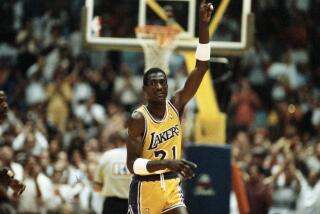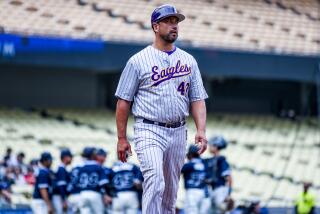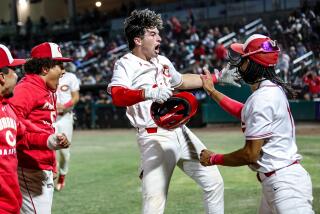A Winning Perspective : Hoover High Baseball Coach Bob Cooper Has Racked Up 408 Victories in 25 Years, but Has Come to Realize That There Are Things More Important Than a Ballgame
- Share via
Bob Cooper has been coaching baseball for 25 years and--pardon him if his steel-blue eyes appear a little quiescent these days--finally, he’s tired.
Concurrent with those years of baseball, Cooper has coached 17 seasons of football, 17 seasons of basketball, spent four years as an athletic director and lived through a personal tragedy that aged him more than all the coaching years in cumulation.
Both the hustle and the hurt, he said, have softened him. Winning games isn’t so important anymore. But even gracious sentimentality takes a beating when you examine Cooper’s record. His high school baseball teams have knocked off opponents 408 times in 610 games.
During a career that began at Harvard High in 1965, flew to new heights with a Southern Section Division 1-A title at Elsinore High (Lake Elsinore, Riverside County) in 1970, and has perpetuated the past 14 years at Hoover High, Cooper has been nothing if not a coach who could manage to win.
“Winning is important,” he said, “it’s just that life is so much bigger than that.”
Hoover versus Glendale, two weeks ago. Bottom of the third inning with two out and Glendale batting. Hoover leads, 6-1. A Glendale hitter lines a drive over the head of Cooper’s right fielder, who takes five steps forward before watching the ball sail 10 feet overhead.
Along the first-base line, Cooper is hunched over, hands on knees, looking as if he’s about to throw up. “Geez, is every ball hit to right field gonna be a base hit?” he screams to his player. “You got to get your eyes checked. Geez, right after the game, we gotta get your eyes checked.”
Top of the fourth, an overweight Hoover player gets a late jump from first base on a ground ball and is forced at second. After returning to the dugout, the portly player kicks a helmet and is frustrated by what Cooper perceives to be more than just being thrown out on this singular play. “Hey, getting thrown out is a part of baseball,” the coach said. And though it is unlikely, Cooper added: “You’ll get there next time.”
Describing Cooper’s coaching style is a difficult proposition. He’s half Sam Kinison, half Julie Andrews. At times, he looks as if his head is about to explode, at others, he’s as calm as a slight breeze to left field.
“He knows when to get tough and when to let us have fun,” said Bryan Day, a junior shortstop. “He gets mad, but he’s like a friend to the players, not a coach. I don’t know anybody who doesn’t like him.”
For his part, Cooper said, “My players play hard for me because they like me. I tell them they’re a piece of garbage, but they still like me.”
Moreover, Day said, “Everyone respects him.”
Part of that respect is couched in Cooper’s willingness to work with players individually after practice. Especially on hitting. “He’s very knowledgeable about hitting,” said Randy Tiffany, an assistant coach. “The kids love that. Eighty percent of practice is spent on hitting. He figures, if you can’t score runs, you can’t win games.”
Cooper’s attention to hitting goes back, back, back, back. As an infielder at Cal State Long Beach in the early ‘60s, he never batted less than .300. “I’ve always liked the Ted Williams theory of hitting--off the back foot,” he said. “I don’t normally teach the George Brett style--off the front foot. I’ll teach it if that’s what a kid wants, but I never hit that way as a player.”
How far Cooper’s ability might have taken him as a professional player became an unanswered question when, at age 22, he was hired as a coach at Harvard High. His abilities as a coach surfaced almost immediately. In two years at Harvard, Cooper built a 30-16 record in baseball and coached football and basketball along the way. He then jumped to Elsinore, where he stayed for eight years, eventually becoming the school’s athletic director.
His 1970 baseball team won 23 of 25 games and went on to the Southern Section title. “One of the highlights of my career,” he said.
The other highlights came later, after Cooper moved to Hoover in 1975. From 1977 until ‘87, the Tornadoes never missed the playoffs.
Hoover has won league titles six times since 1975. Cooper’s 1983 team--probably his best--just missed making the Southern Section 5-A final. Hoover lost in a semifinal, ironically, to the coach’s alma mater, Lakewood High in Long Beach.
Another highlight came earlier this year when Cooper was given an award for “25 years of outstanding service” by the California Baseball Coaches Assn.
Still, the pinnacle of his career was the time he spent from 1980-87 coaching his sons, Rob and Randy. Rob went on to play at Cal State Long Beach and Randy plays for College of the Canyons.
“Working with my boys was very rewarding,” Cooper said.
But during the same rewarding period, Cooper and his wife, Corky, were faced with the most difficult years of their lives. Their youngest son, Ryan, born in 1976, began falling down at about age 4. Baffled by the symptom, the Coopers went to a number of doctors, one of whom diagnosed Ryan with a degenerative brain disease. Over the next three years, the boy regressed and eventually lost his sight.
Ryan died in 1984.
Cooper has difficulty talking about that four-year period. As for baseball, he said, “From 1980-83, I had teams that could run practices without me. I could have sat in the stands and they would have practiced just the way I wanted them to. The players knew I had problems.”
Said Corky: “Those years were the best for baseball. But, personally, they were the worst. The whole experience really put things in perspective.”
Where Cooper’s baseball career will take him is something of a mystery. At 48, he can hardly be considered old. But he’s been around. And he’s grown weary.
“I’m really tired,” he said. “This is the most tired I’ve ever been. Maybe I’m just getting old.”
Three possible roads appear on the horizon for Cooper.
He could remain at Hoover, where he is comfortable, if not exceedingly energized. Other options include coaching at a college or becoming a full-time scout for a major league organization.
If he remains, the almost unheard of mark of 500 wins is within his reach. If he averaged 17 wins a season for the next six seasons, he would reach the milestone. This year Hoover is 13-5. When an inquiry was made at the Southern Section office regarding Cooper’s place on the section’s all-time win list, an official said he knew of no such list, but he was aware of Cooper and that he had “a bunch of wins.”
“I’ve done everything you can do in high school,” Cooper said.
He has recently received an offer for a part-time scouting position from the Kansas City Royals, but Cooper said he probably would wait for a full-time job.
Or maybe he’ll just stay where he is and eventually fade away.
“People can’t believe I’m still doing this,” he said. “I figure I’ve made about 25 cents an hour. Working on the field, teaching the kids, being a counselor to them, sometimes a father.
“It’s a lot of hours, but I don’t know. I’ve tried to care about the boys.
“As for being successful, I’m still not sure I know what the secret is . . .”
After 25 years, though, he most certainly has a decent idea.
More to Read
Get our high school sports newsletter
Prep Rally is devoted to the SoCal high school sports experience, bringing you scores, stories and a behind-the-scenes look at what makes prep sports so popular.
You may occasionally receive promotional content from the Los Angeles Times.






